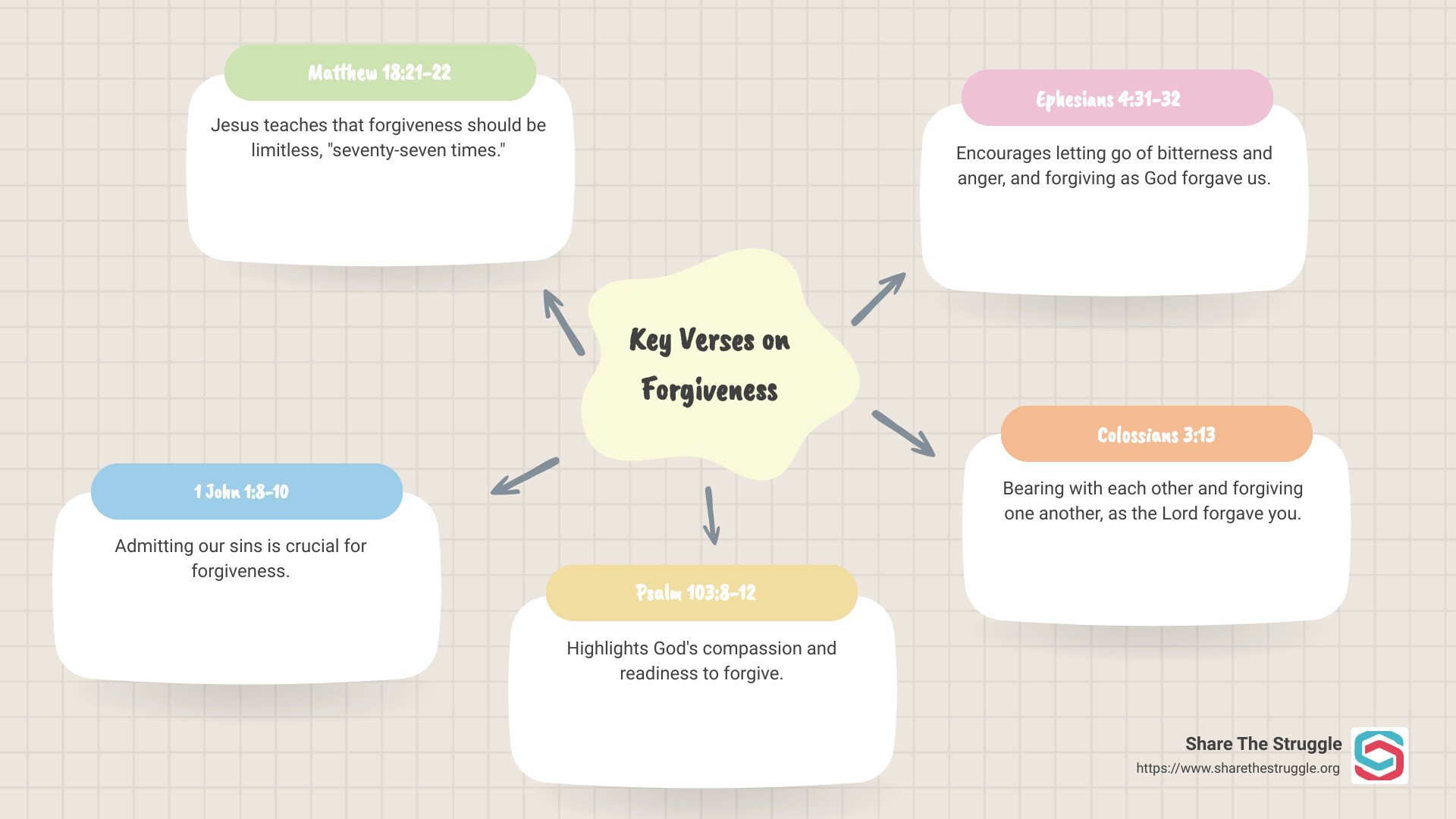Biblical Teachings on Forgiveness: What You Need to Know
Why Forgiveness is Important According to the Bible
When we explore what does the Bible say about forgiveness, we find it's a core theme deeply woven throughout its teachings. At its heart, forgiveness is releasing someone from the penalty of their wrongdoing and offering them love instead.
Here are the essentials:
Forgiveness is rooted in God's character: Psalm 103:8-12 highlights God's compassion and readiness to forgive.
Confession is key: 1 John 1:8-10 emphasizes that admitting our sins is crucial for forgiveness.
Jesus underscores endless forgiveness: Matthew 18:21-22 teaches forgiveness should be limitless, "seventy-seven times."
In the Bible, forgiveness is not just suggested; it's commanded. So whether it's extending grace to others or seeking it for ourselves, forgiveness is central to our faith.
Let's delve deeper into this vital biblical principle.
What Does the Bible Say About Forgiveness?
Jesus' Teachings on Forgiveness
Jesus' teachings on forgiveness are clear and powerful. In Matthew 6:14, He says, "For if you forgive others their trespasses, your heavenly Father will also forgive you." This shows that forgiving others is not optional; it's a requirement for receiving God's forgiveness.
Jesus also emphasizes the importance of limitless forgiveness in Matthew 18:22 when He tells Peter to forgive "not seven times, but seventy-seven times." This symbolic number highlights that forgiveness should be endless, reflecting God's boundless mercy towards us.
One of the most poignant examples of Jesus' forgiving nature is found in Luke 23:34. As He was crucified, Jesus prayed, "Father, forgive them, for they know not what they do." Even in His suffering, Jesus chose to forgive those who wronged Him, setting the ultimate example for us.
True Forgiveness According to the Bible
True forgiveness, according to the Bible, involves letting go of resentment and embracing unselfish love. 1 Corinthians 13:5 teaches that love "keeps no record of wrongs." This means that true forgiveness involves completely releasing any grudges or bitterness.
Ephesians 4:31-32 instructs us to "let all bitterness and wrath and anger and clamor and slander be put away from you, with all malice, and be kind to one another, tenderhearted, forgiving one another, as God in Christ forgave you." This passage emphasizes the importance of kindness and tenderheartedness in forgiveness.
Similarly, Colossians 3:13 urges us to "bear with each other and forgive one another if any of you has a grievance against someone. Forgive as the Lord forgave you." This verse makes it clear that our standard for forgiveness should be God's own forgiveness of our sins.
God's Standard of Forgiveness
God's standard of forgiveness is rooted in complete surrender and the sacrificial system. The Bible explains that forgiveness requires a sacrifice. Hebrews 9:22 states, "without the shedding of blood there is no forgiveness." This points to the Old Testament sacrificial system where animals were sacrificed to atone for sins.
However, this system was only a shadow of the ultimate sacrifice to come. Hebrews 10:1-4 explains that these sacrifices were repeated year after year but could never make perfect those who draw near to worship. It was impossible for the blood of bulls and goats to take away sins permanently.
The ultimate standard of forgiveness is the cross. Jesus' sacrifice on the cross fulfilled the need for a perfect, once-for-all atonement. Hebrews 10:11-12 says, "Day after day every priest stands and performs his religious duties; again and again he offers the same sacrifices, which can never take away sins. But when this priest had offered for all time one sacrifice for sins, he sat down at the right hand of God."
Forgiveness is also tied to confession and repentance. 1 John 1:9 assures us, "If we confess our sins, he is faithful and just to forgive us our sins and to cleanse us from all unrighteousness." Confession is a crucial step towards receiving God's forgiveness.
In summary, biblical forgiveness is about following Jesus' teachings, letting go of resentment, and understanding God's high standard of forgiveness, exemplified by Jesus' sacrifice on the cross. This sets the stage for the next section, where we will explore the power and impact of forgiveness.
The Power and Impact of Forgiveness
Forgiveness is more than just a moral directive; it has profound implications for our emotional, mental, and spiritual well-being.
Forgiveness and Human Flourishing
Forgiveness can lead to transformation and joy. According to the American Bible Society, individuals who practice forgiveness report higher levels of flourishing. Letting go of anger and resentment can significantly improve our emotional and mental health.
Forgiveness in Relationships
Forgiving others and oneself is essential for healthy relationships. The Bible emphasizes this repeatedly:
Matthew 6:14: "For if you forgive other people when they sin against you, your heavenly Father will also forgive you."
Colossians 3:13: "Bear with each other and forgive one another if any of you has a grievance against someone. Forgive as the Lord forgave you."
Ephesians 4:31-32: "Get rid of all bitterness, rage and anger, brawling and slander, along with every form of malice. Be kind and compassionate to one another, forgiving each other, just as in Christ God forgave you."
In the series "Going Home," Charley struggles with forgiving herself for a past mistake. When she learns that the family affected has already forgiven her, she experiences emotional healing and is able to refocus on her relationship with God. This story illustrates how forgiving oneself can be as crucial as forgiving others.
The Role of Confession and Repentance
Confession and repentance are key components of forgiveness. They pave the way for spiritual growth and reconciliation with God.
1 John 1:9: "If we confess our sins, he is faithful and just to forgive us our sins and to cleanse us from all unrighteousness."
Acts 2:38: "Peter replied, 'Repent and be baptized, every one of you, in the name of Jesus Christ for the forgiveness of your sins. And you will receive the gift of the Holy Spirit.'"
Acts 3:19: "Repent, then, and turn to God, so that your sins may be wiped out, that times of refreshing may come from the Lord."
Daniel 9:9: "The Lord our God is merciful and forgiving, even though we have rebelled against him."
Confession is not just about acknowledging our wrongs but also about committing to change. When we repent, we turn away from our sins and seek a renewed relationship with God. This leads to a profound spiritual transformation, filling our lives with joy and peace.
Forgiveness is a journey that involves multiple steps, but each step brings us closer to emotional healing and spiritual growth.
Next, we’ll delve into practical steps you can take to embrace forgiveness in your daily life.
Conclusion
The Bible's teachings on forgiveness are profound and transformative. From Jesus' instructions to forgive "seventy-seven times" (Matthew 18:22) to God's promise to remember our sins no more (Hebrews 8:12), forgiveness is a key theme throughout scripture.
Forgiveness is not just a divine command but a pathway to emotional and spiritual well-being. By letting go of grudges and resentment, we release ourselves from the heavy burden of anger and bitterness.
Importance of Forgiveness
Forgiveness is crucial for both our mental and spiritual health. It allows us to live in harmony with others and align ourselves with God's grace.
Emotional Healing: Holding onto anger can cause stress and emotional pain. Forgiveness helps us find peace.
Spiritual Growth: Forgiving others and ourselves brings us closer to God and deepens our faith.
Healthy Relationships: Forgiveness is key to maintaining strong, loving relationships.
Practical Steps for Forgiveness
Acknowledge the Hurt: Recognize the pain and its impact on you.
Confess and Repent: Admit your own mistakes and seek God's forgiveness.
Pray: Ask God for the strength to forgive others.
Let Go of Resentment: Release any lingering bitterness.
Seek Reconciliation: If possible, make amends with the person who hurt you.
At Share The Struggle, we believe in the transformative power of forgiveness. Our faith-based approach combines biblical wisdom with practical strategies to help you navigate the journey of forgiveness.
Embracing forgiveness is not about excusing bad behavior but about freeing your heart and soul. By doing so, you can experience the fullness of God's love and grace.
By integrating these teachings into your life, you can find peace, joy, and a deeper connection with God. If you need support, consider reaching out to a Christian coach to guide you on this journey.



